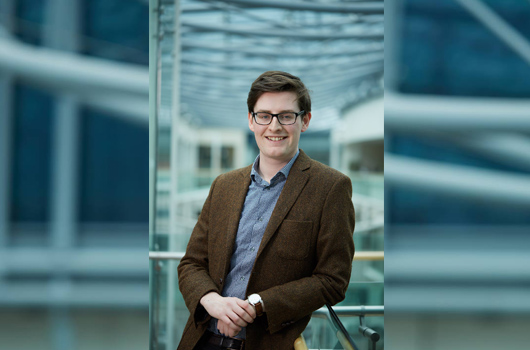 Fergus Kennedy, a third-year Biological Sciences undergraduate at Somerville College, has won a UK-wide award for an innovative project aimed at administering vaccines in the developing world using new technology.
Fergus Kennedy, a third-year Biological Sciences undergraduate at Somerville College, has won a UK-wide award for an innovative project aimed at administering vaccines in the developing world using new technology.
Fergus is the winner in the Healthcare category of the Telegraph STEM awards, sponsored by British pharmaceutical company GlaxoSmithKline and in association with Babcock International Group, for devising the ParaPatch – a concept that uses drones to deliver self-administered vaccines to the most inaccessible areas of the developing world.
The innovation will use microneedle vaccine patches, which are thermostable, needle-free and safe enough to administer yourself. Using drones will help avoid poor and unpredictable infrastructure that hampers current vaccination campaigns travelling by road. In reducing the human labour and travel times associated with vaccinating rural populations, ParaPatch would alleviate stress on the overstretched healthcare systems of developing nations, says Fergus, and lead a new and modernised approach to global vaccination.
Fergus, who is originally from Leicestershire, will compete against the three winners from the energy, innovation and aerospace categories to determine the overall STEM winner who will receive a cheque for £25,000 and a bespoke mentoring programme. They will present to a panel of judges, including Babcock International Group Chief Executive Peter Rogers, on the 16th of June before the winner is announced.
Competition entrants in the Healthcare category were set the challenge of devising a way to solve one of the following problems: to develop vaccines more quickly and efficiently, to produce vaccines against different types of disease, to administer vaccines to the people who need them through new devices or to transport and store vaccines in and to the developing world.
Fergus has always been interested in the application side of science and will be doing a Master’s degree next year in Biological Sciences Enterprise at Cambridge. Fergus says that when he first read about the competition and read the questions in the healthcare category, the idea of using drones to administer vaccines came immediately to him. If he wins, Fergus says he will use the money to help fund him through his Master’s.
In addition to the many trips he went on for his Biological Sciences MPhil – including a field course to Tenerife on plant life diversity and two weeks in the Bornean jungle for a field course on the module of Biology – Fergus says the main highlight of his time at Somerville has been having Somerville’s Lecturer in Plant Sciences, Dr Timothy Walker, as a tutor.
‘When I was applying for Biology my decision was largely based on speaking with tutors Mr Timothy Walker and Professor Alex Rogers,’ says Fergus. ‘Tim is the man; he’s one of the best things about my experience here. People know how good he is and they come from all around the University to talk to him.’
We wish Fergus the best of luck in the upcoming finals of the Telegraph STEM awards and in his Master’s at Cambridge. For more information on the awards, please follow this link.